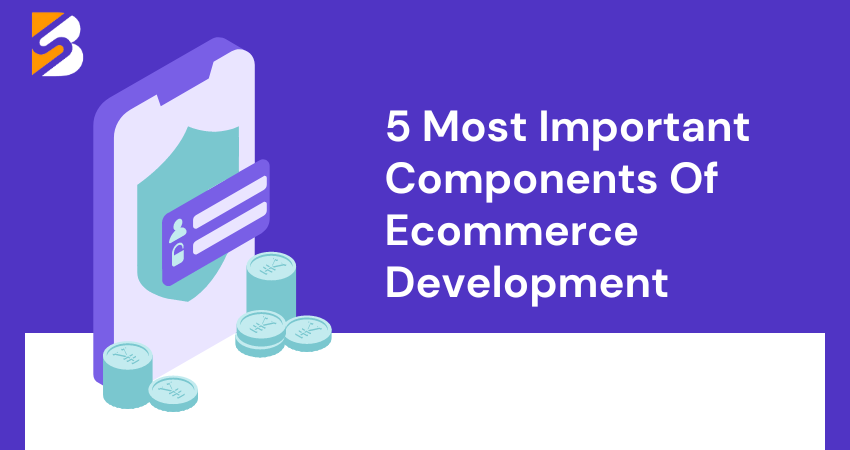Ecommerce has transformed the way businesses operate, offering unparalleled opportunities to reach a global customer base. However, building a successful ecommerce platform requires careful consideration of various crucial components. In this blog, we will delve into the five most important components of ecommerce development, backed by thorough research and industry insights. By focusing on these components, businesses can create a robust and thriving online store, while benefiting from the expertise of ecommerce development services.
5 Key Components of Ecommerce Development
Ecommerce development is the backbone of any successful online business. To create a thriving digital storefront, five key components play a crucial role in shaping the customer experience and driving growth:
User-Centric Website Design
A user-friendly website design lies at the heart of a successful ecommerce venture. The design should prioritize user experience by being visually appealing, intuitive, and easy to navigate. Implementing clear and concise product categories, prominent search functionality, and visually appealing product images will enhance user engagement. Additionally, optimizing the checkout process for simplicity and speed is crucial for reducing cart abandonment rates. Mobile responsiveness is also vital, as an increasing number of customers prefer shopping on smartphones and tablets.
Research suggests that a well-designed user interface can lead to a 200% improvement in website conversion rates, making it a critical component of ecommerce development.
Robust and Secure Payment Gateway
Security is paramount in ecommerce, and a robust payment gateway ensures that your customers’ sensitive information remains safe and protected. Opt for a reliable payment gateway provider that offers industry-standard encryption, fraud prevention measures, and Payment Card Industry Data Security Standard (PCI DSS) compliance. Popular choices like PayPal, Stripe, and Braintree offer seamless integration, multiple payment options, and a trusted reputation, instilling confidence in your customers during the checkout process.
Studies show that nearly 30% of customers abandon their purchases due to security concerns, making a secure payment gateway an essential component of ecommerce development.
Efficient Inventory Management System
Effective inventory management is critical to meeting customer demands, minimizing stockouts, and optimizing order fulfillment processes. An efficient inventory management system enables real-time tracking of inventory levels, automates reorder notifications, and facilitates seamless integration with your ecommerce platform. By implementing such a system, you can prevent overselling, streamline supply chain operations, and provide accurate stock information to customers.
Research indicates that efficient inventory management can improve inventory accuracy by 20-30% and reduce out-of-stock situations by 10-20%, making it a crucial component of ecommerce development.
Seamless Product Catalog and Intelligent Search
A comprehensive and well-organized product catalog is the foundation of a successful ecommerce store. Implement a robust content management system (CMS) that allows you to create and manage product listings effectively. Each product should have detailed descriptions, high-quality images, pricing information, and relevant attributes. To enhance the user experience, integrate intelligent search functionality with filters, sorting options, and predictive search. This empowers customers to quickly find products and make informed purchasing decisions.
Studies indicate that 30% of customers prefer using search functionality when shopping online, underscoring the importance of a seamless product catalog and intelligent search as key components of ecommerce development.
Analytics and Reporting
Data-driven decision making is essential in ecommerce, and analytics and reporting tools provide valuable insights to drive strategic improvements. Implement robust analytics platforms, such as Google Analytics or ecommerce-specific solutions, to track key metrics like conversion rates, average order value, customer acquisition channels, and customer behavior patterns. This data empowers you to optimize marketing strategies, personalize customer experiences, and identify areas for improvement in your ecommerce store.
Research highlights that organizations that leverage analytics effectively are 1.6 times more likely to have a competitive advantage in customer acquisition and profitability, making analytics and reporting a vital component of ecommerce development.
Conclusion
Ecommerce development entails multiple components, but focusing on the five aforementioned areas will set your online store on the path to success. By prioritizing a user-centric website design, implementing a secure payment gateway, employing an efficient inventory management system, creating a seamless product catalog and intelligent search, and leveraging analytics and reporting tools, you can build a robust and thriving ecommerce platform. Embrace these components, backed by thorough research and industry best practices, to enhance customer satisfaction, drive sales, and achieve long-term success in the dynamic world of ecommerce.



